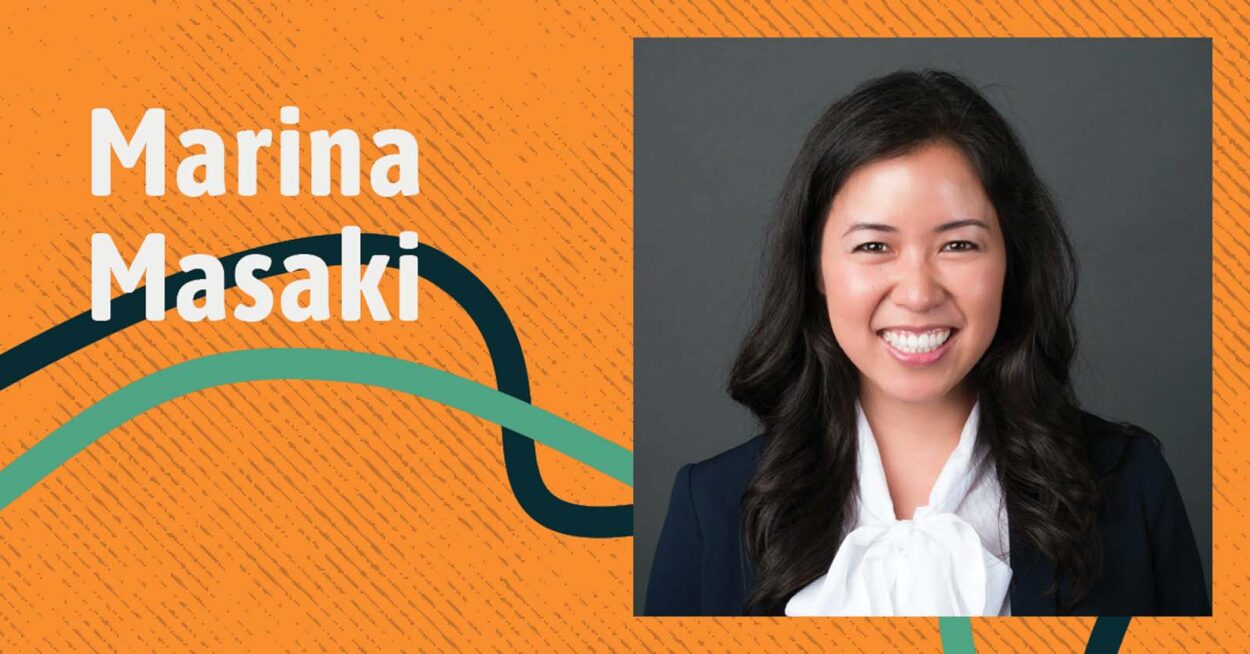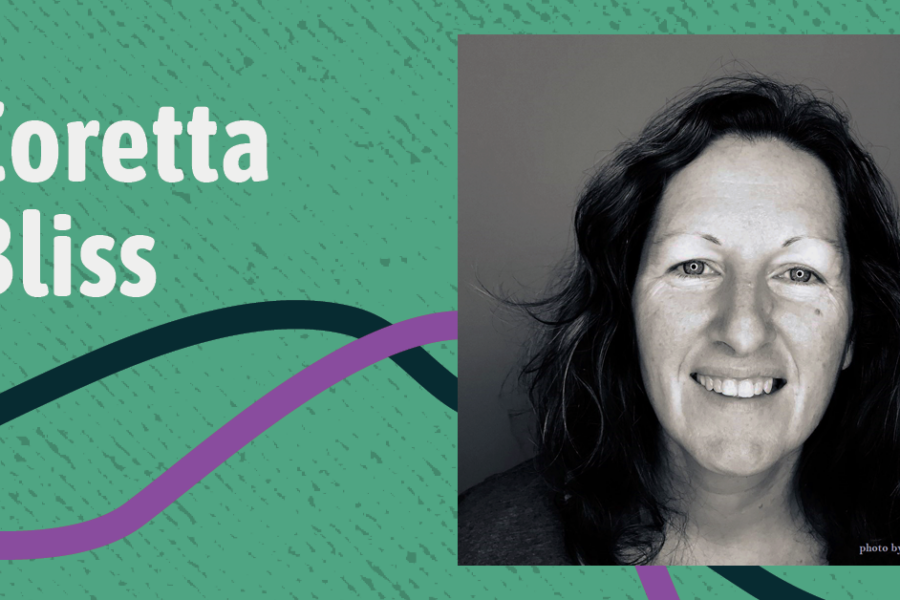When she was a kid, Marina Masaki’s family didn’t talk openly about sex. This wasn’t unusual for a young person growing up in the U.S., and in particular in Japanese-American families like the one she grew up in. Sexuality is a subject that many parents are uncomfortable discussing with their children—even if this reticence puts them at risk later on.
This is something that Masaki, a student in the MA in Couple & Family Therapy at Antioch University’s Seattle campus, wants to change because, at some point in their lives, almost everyone will need to communicate about intimacy. “It’s something that comes up a lot in relationships or just being an adult,” she says. “It’s part of life.” And yet the resources and awareness that make conversations around sexuality possible are unevenly distributed among families and communities. This is why, as part of her studies, Masaki is also pursuing a Certificate in Sex Therapy.
Becoming an expert in the area of sexuality is only one example of the ways that Masaki is using her studies and her training for a career as a therapist intentionally to disrupt unhealthy patterns, heal wounds, and provide services she sees lacking in her communities. While the stigmatization of mental health is shifting broadly across U.S. society, she still sees so much work to be done to help everyone access the language and tools to talk about and treat mental health.
These gaps in access are a driving force that motivates Masaki’s studies. Becoming a therapist is her way to break stigmas, minimize silence, and support others in their relationship journeys—and especially to support people in Asian-American and other BIPOC communities.
The Path to Counseling
Growing up as the middle child in her family, Masaki was often put in the middle of conflicts as well. It was an experience that gave her the ability to see multiple perspectives and the good in all sides. In some ways, it’s like she’s spent a life preparing to become a therapist, as she has plenty of experience using her communication, understanding, and empathy to help those around her. “It’s really rewarding to work with an individual and hear about their progress and improvements. But there’s also something about seeing change in front of me, between people,” says Masaki. “That’s something that I love to do.”
But this wasn’t her first career path. Before coming to study at Antioch, Masaki worked in the tech industry for a decade. She was a quantitative UX researcher, using data analysis to understand and improve user experiences of websites and apps. It was the COVID-19 pandemic that made Masaki, like so many others, rethink what was important in her life. She realized the work she was doing wasn’t fulfilling and that she was ready to make a change.
There were parts of her work that she enjoyed, like advocating for people who used products so they could have a better experience. She gained insights into the behaviors of potential users through carefully looking at the surveys and logs data, and she used this data to communicate their needs to the product management team. But she realized that it was the connection to people that most consistently made things interesting. As she explains, “I really craved working closer, more intimately, one-on-one, one-to-many, and with families.”
She wanted to find work where she could build more connections and improve people’s lives in a more intimate way. So she decided to pursue mental health treatment, and eventually, she decided to enroll in the MA in Couple & Family Therapy.
Building Community to Support Peers and Herself
A major emphasis for Masaki in this new career path is advocating for people of color. She is also working to bring her analytical skills from her former profession into both her studies and her future work. As an Antioch student, she is already combining both of these passions as a student leader in the Counselors of Color Student Support Group. In this group, Masaki helps advocate for other students and builds professional skills and confidence. “I met really inspiring folks through these organizations and met people who experienced similar things as I have,” she says. “I am a believer in the power of community.”
These groups have helped her and other students navigate and change the program in a field that has been historically defined and shaped by white people and white cultural norms. “Our program, although we have a very strong mission around social justice and inclusion, is still predominantly white,” Masaki says. “The students that come to our support group are often one of a few students of color in their classrooms, so I’m just holding space for them to share experiences.”
She often surveys members to see what events and support they’d like to see more of, and she collects feedback they’d like to send back to faculty members. Masaki’s work advocating for the BIPOC student community helps the programs be better at supporting students of color by using their direct recommendations to make changes.
But her leadership doesn’t only provide care and support for her fellow students—it helps Masaki feel like she’s a part of a community in the program. She builds on this through her partnership with the CFT Student Advisory Group, where she and other students collect feedback from CFT students and present the results to the program so that it can better support students. Faculty in the program have backed Masaki’s efforts by taking her feedback and recommendations seriously.
One example of this is conversations about how to increase mentorship, which is increasingly important to students and is something Masaki is passionate about as well.
Realizing that there was a need, Masaki researched possible solutions, and ultimately she discovered that there had formerly been an Antioch University Seattle Mentorship program that allowed for identity-based matching based on race, sexual orientation, gender identity, etc. Unfortunately, the program was on hiatus. She expressed the dire need for this program to Danyaile Hammond, the Student Success and Retention Specialist at Seattle. Eventually, Hammond and the wider university figured out how to bring the mentorship program back to life. When they did, Masaki says, “I made sure to obtain buy-in from the Couple and Family Therapy Program to promote it and ensure its success.”
Today, the program is thriving, and Masaki serves as a mentor herself. “Mentorship was important in my previous career,” she says, “and currently mentoring BIPOC students is so rewarding. So throughout my career, I want to help future generations of therapists grow and thrive.”
Destigmatizing Sex and Sex Therapy
Last year, Masaki started her Certificate in Sex Therapy. The certificate counts towards graduation requirements for the MA, and it also connects to her deeper desire to be a resource for her community.
When living in San Francisco, Masaki volunteered with the Asian Women’s Shelter, where she was trained in domestic violence advocacy and learned about the nonprofit organization API Chaya. API Chaya is a survivor-led organization that focuses on cultivating healing and serving survivors of sexual violence, human trafficking, and domestic violence from Pacific Islander, Native Hawaiian, Asian, and South Asian communities. She found the work rewarding, and it’s given her lots to think about. Masaki now volunteers her time with API Chaya in Seattle and says that “It has made me think about integration, power, and language in Asian communities.” It’s even part of what has led her to her current degree program. As she puts it, “It’s made a big impact in my life.”
Masaki sees her interest in sex therapy as expanding her positive impact on her communities. Sex therapy fosters positive attitudes towards sexuality and supports the acceptance of gender and sexual identities, intimacy development, and sexual functioning. Too often, these topics are undiscussed in Asian communities. “I want to destigmatize it and talk about it more,” she says “, especially in the Asian community, which I’m a part of.”
She also plans to pursue a Certificate in Trauma Counseling, which is offered through Antioch’s Seattle campus. Masaki sees an overlap between matters in sex therapy and experiences of trauma. She wants to combine the two approaches to help others work through a combination of issues.
Masaki has experienced the benefits of having mental health support herself. She has long been seeing her own personal therapist, and she especially appreciates the experience of engaging in couples therapy in the past. “It was so helpful to see how my partner’s family background interacts with how he relates to me,” she says, “and how intergenerational patterns affect us.”
Most recently, Masaki has accepted a position as a student board member for the Washington Association for Marriage and Family Therapy, representing all Couple and Family Therapy students in Washington State. In that role, her main passion project is increasing paid internships for mental health interns.
Through her own experience with therapy, advocating for fellow students from communities of color, and her volunteer work, Masaki is building a world where people can have tough conversations about the things that are most important to them. And she’s using her whole identity, her life experiences, and now the educational opportunities she’s seizing to maximize her impact.



